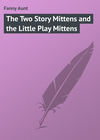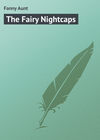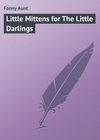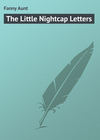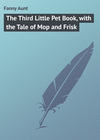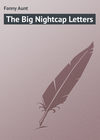Czytaj książkę: «The Two Story Mittens and the Little Play Mittens», strona 4
MASTER EDWARD'S TRIAL; OR, DO AS YOU WOULD BE DONE BY.
A LITTLE PLAY
CHARACTERS
Mrs. Langdon. By Anna.
Edward, her son, thirteen years of age. By Harry.
Mary Brown, his nurse. By Clara.
Morris, Mary's son, of the same age as Edward. By Master Augustus Averill, a friend of Harry's.
Mr. Sherwood, Edward's tutor. By Johnnie.
Jane, his mother's maid. By Minnie.
Patrick, the waiter. By Willie.
Andrew, the gardener. By Bennie.
Scene — A fine House in the Country. A Parlor opening into the Garden.
Scene I. – Mrs. Langdon and Mr. Sherwood
Mr. Sherwood. No, madam; I have come to bid you adieu. It is impossible. I cannot, I will not stay here another day.
Mrs. Langdon. But, Mr. Sherwood, listen a moment!
Mr. S. No! I have made up my mind! I am tired of losing my time and pains with Edward!
Mrs. L. Please have a little patience. Try him once more.
Mr. S. He has already abused my patience beyond all bounds. He is wilful, ungrateful, idle, and stupid; and all the blame will fall on me, whom you have employed to educate him.
Mrs. L. Can you believe that I would blame you, who have been so kind to my son? Remember, that when my husband died, you promised me to devote yourself to my fatherless boy. Will you leave your work undone? He has talents, a good heart —
Mr. S. No, madam; you deceive yourself. His heart is bad; his character unamiable; he is proud, vain, selfish, wicked.
Mrs. L. What! wicked!
Mr. S. Yes, madam. Does he not treat your servants as if they were slaves? Does not everybody hate him?
Mrs. L. Oh, how severe you are! My dear son is young: he has pride, to be sure; and that very pride once caused you to say that you would make a great and good man of him.
Mr. S. Yes, I said so; and perhaps I might have succeeded without you —
Mrs. L. Without me! Why, what can you mean?
Mr. S. Do you wish me to be frank with you?
Mrs. L. Certainly. I shall feel obliged to you.
Mr. S. Well; it is you who spoil the effect of all my lessons. It is you who spoil Edward. Excuse me, but I must say it.
Mrs. L. I, Mr. Sherwood! I confess I love him above all other earthly possessions; but that is surely excusable. He is the image of a husband taken away from me in the first year of our marriage. You remember my grief was so excessive that I could not nourish my poor child; and by the advice and entreaties of my relatives and physician, I consented that he should be taken into the country by my humble, faithful friend, Mary Brown, who nursed him for eighteen months with her own child, while I was sent to the West Indies, and afterward to Europe, to recover my health. Edward is all I have.
Mr. S. If you love him so much, send him to boarding school.
Mrs. L. Impossible! I cannot part with him. But I will put him entirely under your control. Only stay, and you shall govern him just as you like.
Scene II. —Enter Patrick
Mrs. L. Patrick, where is my son?
Patrick. I don't know, ma'am.
Mrs. L. What? You don't know?
Patrick. No, ma'am. After taking his lessons this morning, he made me dress him three times. Yes, ma'am, three times! and by way of paying me for my trouble, he hit me a blow on the side of my head, and crying, "Take that, old bog-trotter" – he ran off laughing; and five minutes after that, when I was talking with Andrew on the edge of the hill at the back of the house, he came suddenly up behind and upset us both. My back is all but cracked.
[Rubs his back.
Mr. S. You see how he treats your servants!
Mrs. L. Well! but he did it laughing. It was only his fun, dear little fellow! Patrick, go find him, and bring him here.
Patrick. And suppose, ma'am, he won't come?
Mrs. L. Tell him his mother wants him.
Scene III. —Enter Andrew
Patrick (going out, to Andrew). Where am I to find him? Have you seen him?
Andrew. Seen who?
Patrick. Master Ned.
Andrew. Yes, I have seen him; I see a great deal too much of him; he has just chased me out of the garden with a hay fork.
Patrick. Is he there now?
Andrew. Oh yes; he tied an old hen fast by the leg to the fence, and is shooting at her with his bow and arrows.
Mrs. L. What a boy! how thoughtless! Patrick, go and get him.
[He goes out.
Scene IV. —Enter Jane
Andrew (twisting his hat about, and standing first on one leg, then on the other). Mrs. Langdon —
Mrs. L. Well, Andrew, what is it?
Andrew. I am your gardener, ma'am; am I not?
Mrs. L. Yes, Andrew.
Andrew. I have always tried to give you satisfaction?
Mrs. L. Certainly. You have been very faithful.
Andrew. You have fed me well, paid me well, and, what is far better, you are good and kind to me, which I like more than money, because the one you owe me, and the other you give me of your own free will.
Mrs. L. Well, Andrew —
Andrew. Well, Mrs. Langdon, I am going to leave you against my own desire. You are an excellent mistress, and I don't want to leave you, but it must be —
Mrs. L. Andrew, I am surprised! Why do you wish to leave me? Have you anything to complain of? Have I done you any injustice?
Andrew. Oh no, ma'am! You are all kindness and goodness; neither proud, scolding, nor brutal; but everybody is not like you.
Mrs. L. Do the other servants impose upon you?
Andrew. Oh dear, no, ma'am! they are good and honest.
Mrs. L. What do you complain of, then?
Andrew. Why, ma'am, since I have begun, I will go on. Every man who respects himself, takes a pride in his work. If he is a gardener, he likes to hear people say, "There is a capital garden! Those vegetable beds are very nicely kept!" Well, it makes me mad to see your money and my work all wasted and destroyed.
Mrs. L. But how?
Andrew. That's just it. I know how, and you don't.
Mrs. L. Will you tell me?
Andrew. Well, it's Master Ned.
Mrs. L. Master Ned?
Andrew. Yes, ma'am. He is a perfect little Satan; he keeps me running after him, till I am out of breath, and perfectly hoarse with talking.
Mrs. L. Why! What has he done?
Andrew. The same he does every day: ten ground moles, fifteen chickens, twenty pigs, would do less injury in a year than he does in one day. He upsets the planks, tears up the walks, breaks the windows of the hot beds, tramples on the flowers, breaks down the pear trees, plays the mischief in the vegetable garden, and runs off with my tools. I can't stop him; and when I say, "Master Ned, you must not hinder me so in my work; if you want to turn double somersets, go and do it in your dear mamma's parlor; go and plague Mr. Sherwood, or Patrick, or, still better, torment Jane, and leave me to plant my cabbages." Do you know how he answers? By cracking me over the shoulders with his switch, and crying out, "Look out, old potato top, or I'll tumble you into the pond." I might as well ask the river to run up hill. And look here, ma'am, see this picture (shows picture) he drew of me, watering the garden in a thunder storm, as if I ever did such a thing! or looked like that, either!
Mr. S. In a short time, no one will be able to live with him.
Mrs. L. Dear me! It is nothing but his high spirits and love of mischief! But I own you are not unreasonable, Andrew. I don't want my son to tease you, much less ill-treat you. I will forbid him, before you, from going in the garden.
Andrew. Good! Only do that, and I will give him my finest flowers, and my best fruits, if he will only keep away.
Mrs. L. (sighing). I seem to have made twenty excuses for my son in ten minutes; but you shall be satisfied.
Jane. Mrs. Langdon, I must also speak to you about Master Ned.
Mrs. L. Well.
Jane. This morning he opened the cage door and let your canary fly away, and twisted poor Poll's neck because she said, "Bad boy!"
Mrs. L. Oh! oh! my parrot's neck!
Jane. Yes, ma'am.
Mr. S. Now, madam, this is not thoughtlessness: it is a case of actual badness.
Jane. Yes, and he does something as bad every day.
Andrew. Why, he is worse than Lucifer!
Jane. Every morning, ma'am, he overturns your toilet table, spills the cologne water, upsets your work box, makes your finest letter paper into boats, and puts the kitten to sleep in the crown of your best bonnet; and then, when I beg him to behave, he calls me an old cat, and a buzzard, and a red-headed crab.
Mrs. L. Why have you not told me this before?
Jane. Why, ma'am, I have; but it has always ended by his being excused and I scolded.
Mrs. L. Stay here. You shall see if I excuse him! He might change his clothes ten times, pull up a plant or two, pick a few flowers, or even trouble you at your work. I don't see anything so very dreadful in all that. But to twist my parrot's neck! Oh! —
Scene V. —Enter Patrick
Mrs. L. Well, Patrick —
Patrick (rubbing his legs and making wry faces). He is coming, ma'am —
Mrs. L. What's the matter?
Patrick. Master Ned has been breaking a stick over my legs.
Mrs. L. (very angry). The child's a demon! I am outrageous! I am furious!
Mr. S. Control yourself, madam! do not fly so suddenly from extreme indulgence to severity; do not correct a child when you are in a passion.
Mrs. L. You may be right, sir, but I shall punish him as he deserves.
Andrew. Please don't beat him, ma'am. Here he comes.
Scene VI. —Enter Edward, who runs up to his mother, and is about to kiss her
Edward. Were you asking for me, mamma? dear, pretty mamma!
Mrs. L. Stand back, sir! I don't kiss a bad boy!
Edward. A bad boy! Why, mamma, what have I done?
Mrs. L. Do you dare to pretend that you do not know? Look at Andrew, Patrick, and Jane!
Edward. I see them. Have they been complaining of me?
Mrs. L. Yes, and I am astonished at what they tell me.
Edward. The mean things! Mamma, they —
Mrs. L. Take care, sir! Don't add lying to your other crimes.
Edward (looking angry). But what do they say I have done? You scamp of a turnip top, Andrew! is it you who are trying to rob me of my mother's love? Such a good boy as I am, too!
Andrew. You a good boy! about as much as the old gray donkey is a robin redbreast. No! you are a nuisance, and ought to live up in the air in a balloon by yourself. You have ruined my garden; and whenever I beg you to stop, you answer me with your switch over my legs.
Edward. Oh, mamma, that is too cruel! I only wish to make you a bouquet, when Andrew comes up, yelling like a tiger, "Don't touch those violets! Let that pansy alone! Stop! you shan't take a rose!" Well, what can I do? So I dug up a little plot, pulling out a few vegetables, so as to raise some flowers for you myself. Then Andrew screams out, "What have you done? You have pulled out all my onions!" Then I take another place, and old Sourcrout bawls, "The beets are planted there." I declare it's too bad! I wish to cultivate the earth, because Mr. Sherwood says the most respectable men in the world are farmers; and Andrew, mad as fury, comes and drives me away. Suppose I do spoil some of his stupid cabbages; if I could present you with a flower raised by my own hand, it would be worth all his cabbage heads, and his own too.
Mrs. L. The darling! How he loves me! Andrew, you are a brute!
Andrew. Thank you, ma'am. That's what I call justice.
Mrs. L. My dear son was only seeking to gratify me, and you did very wrong to hinder him. Dear child! he was willing to work like a farmer to please me.
Andrew. I'm dumb! If you wish it, he may scratch up the whole garden, and empty it into the duck pond; he may break down fifty trees a day; he may have a mass meeting of the dogs, pigs, chickens, ducks, turkeys, and the old gray donkey, in the best flower beds; and end by inviting Farmer Green's bull Sampson to dance a hornpipe through the glass into the conservatory. Nothing now will astonish me.
Mrs. L. That will do. My son, I forgive your capers in the garden, but I have a more serious charge against you. How can you excuse yourself for letting my canary fly away? and above all, why did you twist my poor Poll's neck?
Edward. Well, mamma, you would have done the same. I did open the door of the canary's cage. He was poking his poor little bill through the bars, and I was so sorry for him! I thought he wanted to go to his mother, who, perhaps, might be perched up in the tree opposite, and so I gave him his liberty. Mr. Sherwood has often told me that kindness to animals is one of the finest virtues.
Mrs. L. Oh! was twisting my parrot's neck another proof of your kindness? What had the poor bird done to you?
Edward. Nothing to me, mamma; but the wicked little squinting thing had bitten Jane's finger, when she was kindly giving him some sugar; and she cried, and seeing the tears rolling down her cheeks, I got very angry, quite in a rage. I am very sorry, but I did not think that Jane would have been the one to accuse me.
Mrs. L. There, Jane! you are an ungrateful creature! You have tried to poison my mind against my son!
Jane. But, Mrs. Langdon —
Mrs. L. Be silent! Your affair is settled. But, Edward, when Patrick came to call you, why did you break a stick over his legs?
Edward. It was very wrong in me, mamma; but I had just gathered some splendid roses for you: they were on the ground, and the clumsy fellow trampled upon them without seeing them. It put me in such a passion, I did whack him once or twice. I beg his pardon, mamma.
Mrs. L. He should ask yours, you dear boy! I order you all to apologize to my son, or I shall discharge you. You first, Jane. My son would not for twenty gardens, or poll parrots, do a mean thing or tell a lie; he shall be respected and obeyed as I am; and those who don't like it can leave.
Andrew (ironically). I beg your pardon, Master Edward, for the good switching you so kindly gave me; I beg your pardon for the damage you did to the garden; you will oblige me by continuing to tumble everything topsy-turvy, and break all the rest.
Patrick. Forgive me, Master Edward, for all the pretty little capers you cut up.
Edward. Oh, certainly. Mamma, they are good sort of people, after all; and I hope you will excuse their coming to complain of me.
Mrs. L. To oblige you, my dear son, I will. You see, all of you, how amiable he is. And now remember, the very first complaint he makes of you, I will discharge you. Leave the room.
Andrew to Patrick (going out). Here's a pretty how-d'ye-do! He has made his mother believe that black is white.
Scene VII
Mrs. L. You see, my son, though I do not wish the servants to be disrespectful to you, I require you to treat them with kindness. They are human beings like you.
Edward (contemptuously). Like me! I should think not.
Mr. S. Yes, sir! They are not rich, to be sure, or born of a high family, nor is it likely that their heads will ever burst with the knowledge a fine, thorough education gives; but they are capable of every good and noble quality of the heart. Do you understand?
Edward. Yes, Mr. Sherwood.
Mrs. L. Try to make everybody love you.
Edward. Dear mamma, I don't care for any love but yours.
Mr. S. But you must care for the respect and friendship of others; which, as Addison says, "improves happiness and abates misery, by doubling our joys and dividing our griefs."
Edward (sneeringly). He talks like a book, don't he, mamma?
Mrs. L. He does, indeed; and if you love me, you will profit by his advice and lessons. Perhaps you owe more to him than to me. Love him, and be grateful to him, for his constant endeavor to cultivate your virtues and talents.
Edward. Love him – I cannot promise that.
Mrs. L. Why not, my son?
Edward. Because I have given all my love to my dear mamma (kissing her).
Mrs. L. You darling! kiss me again! Ah, Mr. Sherwood! can you blame me if I almost adore him?
[Exit Mrs. L.
Scene VIII
Mr. Sherwood. You are ungrateful, to vex and grieve a mother who loves you so dearly. If you loved her as much, you would obey her if she only held up her little finger; but it seems to me a cat-o'nine-tails flourished before you might have a very good effect.
Edward. I am sorry that —
Mr. S. Did you take your writing lesson to-day?
Edward. No, sir. I don't like writing lessons. They are a perfect plague. They give me the cramp in my thumb, and kinks in my fingers.
Mr. S. Essence of switch on the fingers is good for taking out kinks. Has your dancing master been here?
Edward. Oh yes! I love him dearly, he is so funny! He tells me comical stories, and can imitate everybody in the house. Andrew's lumbering, poking walk, Jane's prinking ways, and even you, with your long dismal face, your eyes staring at a book like a cat looking at a fish, and your solemn walk, oh, it would make you die a-laughing! His lessons always seem too short.
Mr. S. What is that sticking out of your pocket?
Edward (pulling it out and looking at it). Oh! ha, ha! It's a portrait I drew of you, as you look when I don't know my lessons.
Mr. S. Give it to me. (He takes the caricature and looks at it, but shows no anger.) So you prefer to spend your time in an unamiable, contemptible occupation like this, to acquiring useful lessons.
Edward (looking a little ashamed). Well, I like to be amused. It was only a little fun. It was not meant for you to see.
Mr. S. Will you give me an account of your reading to-day?
Edward. I – I – have not been reading, sir.
Mr. S. Not reading? Why?
Edward. Because the book you gave me had so many long, stupid words, that I couldn't understand what it was all about, so I just pitched it out of the window.
Mr. S. You call a book stupid which has such a thrilling account of the bombardment of Vera Cruz, with a fine engraving showing you the great General Scott and his brave soldiers? I wonder at you! You have a head, and so has a drum; both empty.
Scene IX. —Enter Mrs. Langdon, Mary Brown, and Morris, her son
Mrs. L. See, my son, I bring you one of your best friends – your dear old nurse Mary, and her son, who is almost your brother.
Mary (running up to kiss him). How do you do, dear, dear child! how handsome you are! Here's your old play-fellow, Morris; don't you remember him?
Edward. No!
Morris (who has a nice little cream cheese wrapped up in a napkin). I remember you. You're my dear brother Edward. See – I have brought you this cream cheese; my mother made it on purpose for you – take it – don't you know me now?
Edward (who recoils, and takes twenty-five cents out of his pocket). Here, take this, Morris.
Morris (coloring indignantly). I did not ask you for money; I don't want it; I am not a beggar.
Edward. But I ought to pay you for the cheese.
Morris (with emotion). Do you think I brought it to you for money? I would rather have thrown it out of the window.
Mrs. L. Never mind, Morris, take the cheese home to your father; it will do him good to eat it.
Morris (taking it and giving it to his mother, and saying, in a disappointed tone), Well, take it, mother.
Mary (looking lovingly at Edward). How handsome he is! how he has grown! My heart warms to him.
Mrs. L. Well, Edward, your kind nurse must have some lunch – go and order some.
Edward (scornfully). Isn't Patrick here?
Mary. No, my son. I asked him to give my old pony some water.
Mrs. L. Go, my son, go; it will gratify me.
Edward. Oh! then I will fly. What shall I order?
Mrs. L. The very best in the house.
Morris (running after him). Wait, Edward, I will go with you, and help you give the order. I know what my mother likes.
Scene X
Mrs. L. Well, dear nurse, how do you get on since you have moved into your new cottage?
Mary. Oh! capitally, ma'am.
Mrs. L. And your husband, big Peter – is he pleased and contented?
Mary. He is so, ma'am, as happy as a king! Daisy – that's our cow, ma'am – has just given us a beautiful calf; we have fifty chickens, twenty geese, and a good old pony who carries our vegetables to the railroad station for the New York market. I thank God, and you who have been so good to us.
